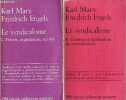297 books for « friedrich engels »Edit
-
Language
French (258)
Russian (39)
-
Century
19th (3)
20th (162)
21st (4)
-
Countries
Belgium (14)
Denmark (7)
France (228)
Switzerland (9)
United States of America (39)
-
Syndicate
ILAB (161)
NVVA (3)
SLACES (3)
SLAM (151)
Topics
- Cogniot georges (1)
- Commune (1)
- Communism (28)
- Communism (33)
- Dialectic (1)
- Economics (1)
- Engels friedrich (116)
- Epistemology (1)
- Europe (1)
- Family (2)
- Feminism (1)
- Germanic languages (21)
- Germany (4)
- Helvética (1)
- History (5)
- Hitler (1)
- Lénine (3)
- Leninism (1)
- Linguistics (1)
- Literature (4)
- Marriage (2)
- Marx karl (150)
- Newspapers press (1)
- Philosophy (69)
- Policy (2)
- Political economy (6)
- Religions (1)
- Socialism (24)
- Sociology (1)
- Switzerland (1)
- Theatre (4)
- Trade unionism (3)
- Translation (1)
- War 70/71 (1)
- Willy (1)
- Zazzo rené (1)
Textes sur la méthode de la science économique (édition biligue en regard)
1974 11x18. 1974. Broché. 238 pages. Très bon état
Etudes philosophiques (nouvelle édition revue et complétée)
Editions sociales 1961 14x22. 1961. Broché. 208 pages. Très bon état
Das Kapital. Kritik der politischen Oekonomie. Zweiter Band. Buch II: Der Cirkulationsprocess des Kapitals. Herausgeben von Friedrich Engels. - [""THE FORGOTTEN BOOK OF CAPITAL""]
Hamburg: Otto Meissner, 1885. 8vo. Very nice contemporary black half calf with gilt spine. A bit of wear to extremitoes. Inner front hinge a little weak. Title-page a littel dusty, but otherwise very nice and clean. Book-plate (Arnold Heertje) to inside of front board. XXVII, (1), 526 pp. + 1 f. With pp. 515-16 in the first state (""Consumtionsfonds"" with a C) and with the imprint-leaf at the end.
Scarce first edition of the second volume of ""The Capital"", edited from Marx's manuscripts by Friedrich Engels and with a 20 pages long preface by Engels. The second volume constitutes a work in its own right and is also known under the subtitle ""The Process of Circulation of Capital "". Although this work has often been to as referred to as ""the forgotten book"" of Capital or ""the unknown volume"", it was in fact also extremely influential and highly important - it is here that Marx introduces his ""Schemes of Reproduction"", here that he founds his particular macroeconomics, and here that he so famously distinguishes two ""departments"" of production: those producing means of production and those producing means of consumption - ""This very division, as well as the analysis of the relations between these departments, is one of the enduring achievements of Marx's work."" (Christopher J. Arthur and Geert Reuten : The Circulation of Capital. Essays on Volume Two of Marx's Capital. P. 7).The work is divided into three parts: The Metamorphoses of Capital and Their Circuits, The Turnover of Capital, The Reproduction and Circulation of the Aggregate Social Capital, and it is here that we find the main ideas behind the marketplace - how value and surplus-value are realized. Here, as opposed to volume 1 of ""The Capital"", the focus is on the money-owner and -lender, the wholesale-merchant, the trader and the entrepreneur, i.e. the ""functioning capitalist"", rather than worker and the industrialist. ""[i]t was here, in the final part of this book [i.e. vol. II of Das Kapital], that Marx introduced his ""Schemes of Reproduction"", which influenced both Marxian and orthodox economics in the first decades of the twentieth century."" (Arthur & Reuten p. 1).The first volume of ""Das Kapital"" was the only one to appear within Marx' life-time. It appeared 1867, followed by this second volume 18 years later, which Engels prepared from notes left by Karl Marx.
Engels F. Articles. Letters. 1833-1845 In Russian /Engels F. Stati. Pisma. 1833
Engels F. Articles. Letters. 1833-1845 In Russian /Engels F. Stati. Pisma. 1833-1845 M Politizdat 1940. 590 p. We have thousands of titles and often several copies of each title may be available. Please feel free to contact us for a detailed description of the copies available. SKUalb5d6f48648adffb55.
Deville G., Kautsky K., Bauer O., Bernstjen E., Engels F., Kunov G., Ecks
Deville G., Kautsky K., Bauer O., Bernstjen E., Engels F., Kunov G., Eckstein G., Hilferdirng G Karl Marxs Capital In Russian /Devill G., Kautskiy K., Bauer O., Bernshtyen E., Engels F., Kunov G., Ekshteyn G., Gilferdirng G Kapital Karla Marksa. Izlozhenie ucheniya. All 4 volumes presented by Deville G., Kautsky K., Bauer O., Bernstjen E., Engels F., Kunov G., Ekshtein G., Hilferdirg G Krasnodar, Rostov-don Burevestnik. 1924. 374 p. We have thousands of titles and often several copies of each title may be available. Please feel free to contact us for a detailed description of the copies available. SKUalb5d757e7228e388c2.
Engels F. The Peasant War in Germany. In Russian (ask us if in doubt)/Engels F.
Engels F. The Peasant War in Germany. In Russian (ask us if in doubt)/Engels F. Krestyanskaya voyna v Germanii.. M Partynoye 1932. 172 p. SKUalb2154409534c5009f.
Engels F. The Dialectics of Nature. In Russian (ask us if in doubt)/Engels F. Di
Engels F. The Dialectics of Nature. In Russian (ask us if in doubt)/Engels F. Dialektika prirody.. M Politizdat 1941. 338 p. SKUalb65cbfe927452f456.
Engels F. Anti-Duhring. In Russian (ask us if in doubt)/Engels F. Anti-Dyuring.
Engels F. Anti-Duhring. In Russian (ask us if in doubt)/Engels F. Anti-Dyuring.. M Partizdat 1934. 304 p. SKUalbd75a47557d0df9b3.
Lenin (Vl. Ulyanov), Kamenev Yu., Safarov G., Engels F. Convolute. Imperialis
Lenin (Vl. Ulyanov), Kamenev Yu., Safarov G., Engels F. Convolute. Imperialism as the newest stage of capitalism The economic system of imperialism and the chaos of socialism In Russian /Lenin (Vl. Ulyanov), Kamenev Yu., Safarov G., Engels F. Konvolyut. Imperializm, kak noveyshiy etap kapitalizma Ekonomicheskaya sistema imperializma i khadachi sotsializma Society and State Articles 1871-75. Book Publishing Life and Knowledge. 1918. 1919. Lenin (Vl. Ulyanov).Imperialism as the newest stage of capitalism. 1918. 140 p. We have thousands of titles and often several copies of each title may be available. Please feel free to contact us for a detailed description of the copies available. SKUalb88f79ced6ff008cc.
Mill D.-S. Spencer G. Engels F. Auguste Comte and Positivism. On the causes of
Mill D.-S. Spencer G. Engels F. Auguste Comte and Positivism. On the causes of my disagreement with O.Kont.Socialism is scientific and utopian. In Russian /Mill D.-S. Spenser G.Engels F. Ogyust Kont i pozitivizm. O prichinakh moego raznoglasiya s O.Kontom.Sotsializm nauchnyy i utopicheskiy. The Convolutee of their three books. Translated by I.I. Spiridonov. St. Petersburg Typography by B.M.Wolf. Typography, Word,,, 1906 170 and 64 and 56 s. We have thousands of titles and often several copies of each title may be available. Please feel free to contact us for a detailed description of the copies available. SKUalb5389f03b35fb676d.
Engels F. The Origin of the Family Private Property and the State. In Russian
Engels F. The Origin of the Family Private Property and the State. In Russian (ask us if in doubt)/Engels F. Proiskhozhdenie semi chastnoy sobstvennosti i gosudarstva.Second edition corrected. St. Petersburg. Typography by Ya. Trey. 1894. 172 p. We have thousands of titles and often several copies of each title may be available. Please feel free to contact us for a detailed description of the copies available. SKUalb90a91bfa443f9b9b
Engels F. (1820-1895). The origin of the family of private property and the stat
Engels F. (1820-1895). The origin of the family of private property and the state. In Russian (ask us if in doubt)/Engels F.(1820-1895gg.). Proiskhozhdenie semi chastnoy sobstvennosti i gosudarstva.. According to Morgan). St. Petersburg. B.M.Wolf. 1906. 128s. SKUalbc8c6aed2a9d41e19.
Marx K Engels F. Works in 50 Volumes (Edition 2). In Russian (ask us if in doubt
Marx K Engels F. Works in 50 Volumes (Edition 2). In Russian (ask us if in doubt)/Marks K Engels F. Sochineniya v 50-ti tomakh (Izdanie vtoroe). Condition: good We have thousands of titles and often several copies of each title may be available. Please feel free to contact us for a detailed description of the copies available. SKUalb34f3e316a5ab27da
L'ideologie allemande, precede de Karl Marx Theses sur Freuerbach - Collection Essentiel N°1
EDITIONS SOCIALES. 1982. In-12. Broché. Etat d'usage, Couv. légèrement passée, Dos satisfaisant, Rousseurs. 279 pages. . . . Classification Dewey : 100-PHILOSOPHIE ET DISCIPLINES CONNEXES
Karl Marx / Friedrich Engels - MILHAU JACQUES- AUGER HENRI- BADIA GILBERT- BAUDRILLARD JEAN- CARTELLE RENEE Classification Dewey : 100-PHILOSOPHIE ET DISCIPLINES CONNEXES
La situation de la classe laborieuse en Angleterre
Générique Broché D'occasion bon état 01/01/1961 411 pages
Le syndicalisme - Tome 1 + Tome 2 (2 volumes) - Tome 1 : théorie, organisation, activité - Tome 2 : contenu et signification des revendications - Petite collection maspero n°96-97.
François Maspero. 1972. In-12. Broché. Etat d'usage, Coins frottés, Dos satisfaisant, Papier jauni. 221 pages + 249 pages - couverture contrepliée - mouillure sur la tranche en tête du tome 2.. . . . Classification Dewey : 331.88-Syndicalisme
Petite collection maspero n°96-97 - Traduction et notes de Roger Dangeville. Classification Dewey : 331.88-Syndicalisme
Komonistakan Partiayi Manifestë (i.e. Armenian ""The Communist Manifesto""). - [FIRST ARMENIAN TRANSLATION OF THE COMMUNIST MANIFESTO PRINTED IN ARMENIA.]
Yerevan, 1938 8vo. In the original embossed cloth binding with gilt lettering to front board. The profile of Marx and Engels embossed onto front board. Extremities a bit rubbed a underligning in text throughout. 131, (5) pp. + 4 plates (respectively showing Marx, Engels, the title-page of the Original German edition and a letter).
The exceedingly rare first Armenian translation of The Communist Manifesto printed in Armenia.
Lettres sur Le Capital. Correspondance présentée et annotée par Gilbert Badia.
Editions sociales ,1964, in-8 de 456 pages , br. , , .Les frais de port pour la France sont offerts à partir de 20 euros d'achat (Mondial relay )et 30 d'achat (colissimo suivi ). Pour l'étranger : tarif livre et brochure, colissimo international, DHL express
DIALECTIQUE DE LA NATURE (dans oeuvres complètes)
Paris Éditions Sociales 1971 1 8° Broché 364 Un volume broché in 8° de 364 pages, légères rousseurs en queue, bon état général. Poids avant emballage 260 gr, frais d'envoi colissimo 655
Bon état général Remises possibles sur les achats en lot, achetez plusieurs objets à la fois ! Reçoit sur rendez-vous pour consultation des ouvrages.
Komunistièni manifest. - [EXCEEDINGLY RARE UNDERGROUND SLOVENIAN TRANSLATION OF THE COMMUNIST MANIFESTO]
[Slovenia], Agit-Prop komisija centralnega komiteta komunistiène partije Slovenije [Agitprop Commiss Small4to (110x145 mm). In the original black/red printed stapled wrappers. With a few occassional blue underlignings. 31, (1) pp.
Rare Slovenian translation of the Communist Manifesto, printed by an undergorund partisan press. The present edition of the Manifesto was printed and distributed by Agitprop, the Communist Party institution that controlled education, publishing, libraries and mass media from the end of World War II until 1952. Presumably the present publication was, if not the very first, then among the first publications made by Agitprop. Until the end of World War II Agitprop was essentially an underground movement whose goal was to pave the way for communism after the war. After the resistance in Slovenia started in summer 1941, Italian violence against the Slovene civilian population escalated and to counter the Communist-led insurgence, the Italians sponsored local anti-guerrilla units, formed mostly by the local conservative Catholic Slovene population that resented the revolutionary violence of the partisans. After the Italian armistice of September 1943, the Germans took over both the Province of Ljubljana and the Slovenian Littoral. They united the Slovene anti-Communist counter-insurgence into the Slovene Home Guard and appointed a puppet regime in the Province of Ljubljana. The anti-Nazi resistance however expanded, creating its own administrative structures as the basis for Slovene statehood within a new, federal and socialist Yugoslavia.In 1945, Yugoslavia was liberated by the underground resistance and soon became a socialist federation known as the People's Federal Republic of Yugoslavia. Slovenia joined the federation as a constituent republic, led by its own pro-Communist leadership and Agitprop became the official mass media institution.
"MARX, KARL (+) FRIEDRICH ENGELS (+) D. B. RIAZANOV (+) HAYIM HOLMSHTOK (+) M. LEVITAN.
Reference : 53496
(1924)
Komunistisher Manifest [i.e. ""Communist Manifesto]. - [COMMUNIST MANIFESTO IN YIDDISH]
Moskve [Moscow], Tsentraler Farlag Far Di Felker Fun F. S. S. R., 1924. 16mo. With the original front wrapper (lacking spine and back wrapper). With previous owner's name to front wrapper (Henoch Gelernt). Front wrapper and last leaf with a few nicks, otherwise fine and clean. 181, (3) pp.
Rare first Soviet Yiddish translation of Marx and Engel's Communist Manifesto. From the library of Jewish activist Henoch Gelernt.
Komunisticni manifest. [i.e. ""The Communist Manifesto""]. - [EXCEEDINGLY RARE UNDERGROUND SLOVENIAN TRANSLATION OF THE COMMUNIST MANIFESTO]
[Slovene Littoral, Printed for Agitprop, Presumably 1944]. Small4to. In the original stapled printed grey wrappers. Previous owner's name in light pencil to front wrapper and title-page. A few brown spots to title-page, otherwise a very fine and clean copy. 52 pp.
Exceedingly rare Slovenian translation of the Communist Manifesto. This virtually unknown edition is not to be found in any bibliography nor on OCLC. The present edition of the Manifesto was printed and distributed by Agitprop, the Communist Party institution that controlled education, publishing, libraries and mass media from the end of World War II until 1952. Presumably the present publication was among the first publications made by Agitprop. Until the end of World War II Agitprop was essentially an underground movement whose goal was to pave the way for communism after the war. After the resistance in Slovenia started in summer 1941, Italian violence against the Slovene civilian population escalated and to counter the Communist-led insurgence, the Italians sponsored local anti-guerrilla units, formed mostly by the local conservative Catholic Slovene population that resented the revolutionary violence of the partisans. After the Italian armistice of September 1943, the Germans took over both the Province of Ljubljana and the Slovenian Littoral. They united the Slovene anti-Communist counter-insurgence into the Slovene Home Guard and appointed a puppet regime in the Province of Ljubljana. The anti-Nazi resistance however expanded, creating its own administrative structures as the basis for Slovene statehood within a new, federal and socialist Yugoslavia.In 1945, Yugoslavia was liberated by the underground resistance and soon became a socialist federation known as the People's Federal Republic of Yugoslavia. Slovenia joined the federation as a constituent republic, led by its own pro-Communist leadership and Agitprop became the official mass media institution.Not in OCLC
Rewolucja i Kontrrewolucja w Niemczech. (Polish i.e. ""Revolution and Counter-Revolution in Germany""). [Bound with:] Nauki Ekonomiczne (+) Ustroj Socjalistyczny. - [FIRST POLISH TRANSLATION OF MARX'S ""REVOLUTION AND COUNTER-REVOLUTION""]
Warszawa, Bibljoteka Naukowa, 1906. Small4to. Bound in contemporary half calf with gilt lettering to spine with four raised bands. Stamp to title-pages and last leaf, otherwise fine. 277, (3), 154, (6), 51, (1) pp.
First Polish translation of Marx and Engel's articles on the events in the Prussia, Austria and other German states during 1848, describing the impact on both middle-class and working-class aspirations and on the idea of German unification. It was originally published as a series of articles in the New York Daily Tribune 1851 to 1852 under Marx's byline, the material was first published in book form under the editorship of Eleanor Marx Aveling in 1896.
 Write to the booksellers
Write to the booksellers























![Komunistièni manifest. - [EXCEEDINGLY RARE UNDERGROUND SLOVENIAN TRANSLATION OF THE COMMUNIST MANIFESTO]. MARX, KARL (+) FRIEDRICH ENGELS.](https://static.livre-rare-book.com/pictures/LLX/57759_1_thumb.jpg)
![Komunistisher Manifest [i.e. ""Communist Manifesto]. - [COMMUNIST MANIFESTO IN YIDDISH]. "MARX, KARL (+) FRIEDRICH ENGELS (+) D. B. RIAZANOV (+) HAYIM ...](https://static.livre-rare-book.com/pictures/LLX/53496_1_thumb.jpg)
![Komunisticni manifest. [i.e. ""The Communist Manifesto""]. - [EXCEEDINGLY RARE UNDERGROUND SLOVENIAN TRANSLATION OF THE COMMUNIST MANIFESTO]. "MARX, ...](https://static.livre-rare-book.com/pictures/LLX/54613_1_thumb.jpg)
![Komunisticni manifest. [i.e. ""The Communist Manifesto""]. - [EXCEEDINGLY RARE UNDERGROUND SLOVENIAN TRANSLATION OF THE COMMUNIST MANIFESTO]. "MARX, ...](https://static.livre-rare-book.com/pictures/LLX/54613_2_thumb.jpg)

